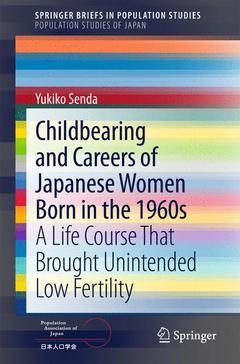Childbearing and Careers of Japanese Women Born in the 1960s, 2015 A Life Course That Brought Unintended Low Fertility Population Studies of Japan Series
Auteur : Senda Yukiko

Blends qualitative and quantitative methods to show how individuals’ choices to balance work and life careers unintentionally and aggregately resulted in a low-fertility trend
Targets the 1960s cohort’s experience of the rapid changes in work conditions and social norms, which caused late marriage and postponed childbirth
Provides a thorough reference to the social conditions of fertility decline in Japan: law and policy changes, countermeasures by companies, and changes in women’s lives
Includes supplementary material: sn.pub/extras
Date de parution : 05-2015
Ouvrage de 126 p.
15.5x23.5 cm
Disponible chez l'éditeur (délai d'approvisionnement : 15 jours).
Prix indicatif 52,74 €
Ajouter au panierThèmes de Childbearing and Careers of Japanese Women Born in the 1960s :
Mots-clés :
Japanese family; Japanese women; Low fertility; Women’s career; Work-life balance



